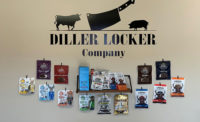Sweet and salty snacks have faced stiff competition in recent years, as meat has established a firm foothold in the snacking sector. The traditional jerky and snack sticks have been joined by meat bars, meaty trail mix and many other novel configurations. Growth in the sector has fueled innovation, as more companies join the hunt to capture market share of meat snacks.
According to a 2017 Nielsen report on the snack aisle, the meat snack category has posted compound annual sales growth of more than 7 percent over the last four years and is now a $2.8 billion category. At the same time, sales growth in the traditional dominant snacks has slowed. Potato chips are still the giant of the snack category, with annual sales of $7.2 billion, but its dollar growth was just 1.7 percent for the most recent year. Pretzels lost 0.5 percent in sales over the same timeframe. By comparison, meat snack sales rose by 3.5 percent.
“American households spend an average of $25.81 per year on meat snacks,” the report stated. “Their per-trip spend on sticks and jerky is also about twice as much as it is on popular staples like potato chips and popcorn ($7.42 vs. $3.61 and $4.01, respectively).”
With such a promising market, it’s no wonder that so many new brands are entering the fray. Entrepreneurs with a vision and a good recipe are looking to see if their jerky can gain a foothold in the market. A few have processing plants where they can produce their own items, but many more will be seeking out a company that can take their recipe and their vision and turn it into a quality product with an attractive package.
“There’s still a pretty big void in having enough capacity to manage the growth that’s out there in the jerky world,” says Chad Lottman, owner of C&C Processing, Diller, Neb.
C&C Processing makes its own products for sale under the Blue Valley Brand and Pony Express Ranch labels. As a co-packer, it provides snack sticks, jerky and meat bars for many customers. Two years ago, Lottman built an entirely new facility, Landmark Foods in nearby Beatrice, to focus on the snack bars and jerky production. The snack bars and extruded jerky products are the top two snacks the company makes.
Lottman says that the popularity in a protein-rich diet like has contributed to the growth in the meat snack category. The meat bar is a more recent development and fills a more specific niche.
“There was a need for active people to have something that was different from the traditional jerky, and didn’t have multiple pieces to handle. The active consumers who were looking at granola bars and protein bars wanted to have something that was meat-based that’s in a single-bar serving,” he explains. “It just started taking off.”
With two facilities and a host of clients, including some large players in the meat snack world, Lottman has had to add layers of sophistication to the company that smaller businesses may not have. As a result, however, the company’s quality control standards are at the level that would be expected of a much larger processor. Those expenditures will help pay for themselves with new business down the road.
“As we move into the future, our ability to handle new customers with new and improved standards, quality checks and an understanding for that level of business helps,” he says.





Report Abusive Comment